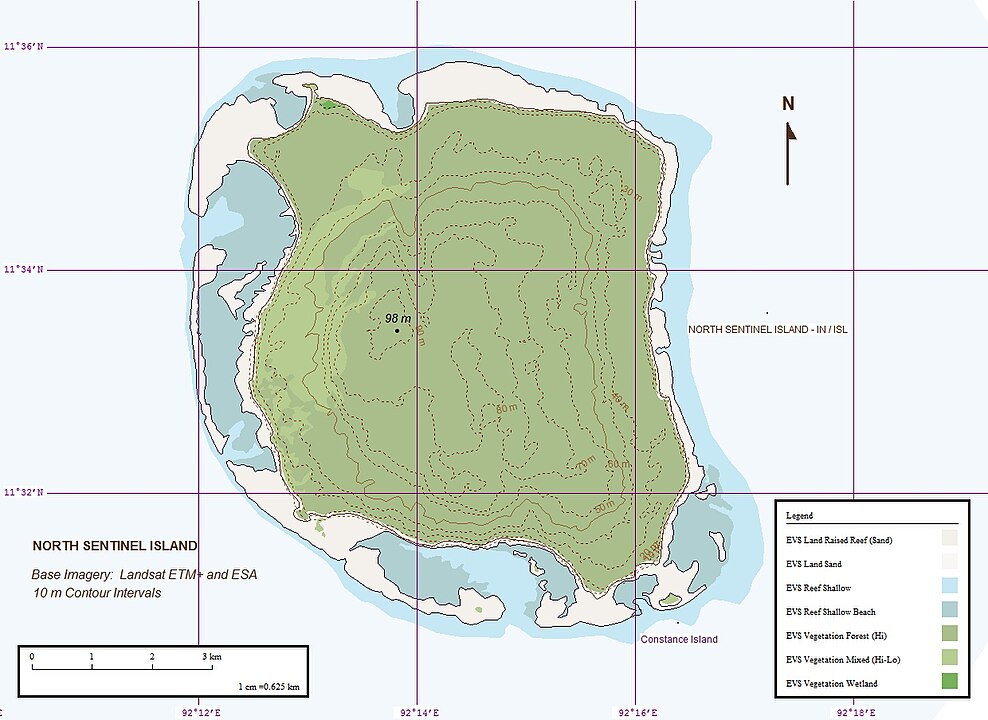In the vastness of the Indian Ocean, shrouded in an aura of mystery and isolation, lies North Sentinel Island. This small piece of land, part of the Andaman and Nicobar archipelago, is one of the last places on Earth untouched by modern civilization. Protected by natural barriers and strict governmental policies, the island is home to the Sentinelese, a tribe that has resisted every attempt at external interaction, preserving a way of life that seems straight out of prehistory.
An Unfathomable People
The Sentinelese, with their dark skin and robust physiques, live in small huts and sustain themselves mainly on fish and seafood. They do not practice agriculture or animal husbandry, and their culture is based on a hunter-gatherer tradition that makes them entirely self-sufficient. Aerial images reveal an island covered in dense tropical vegetation, with barely visible paths cutting through the jungle—silent traces of their discreet presence.
Their hostility toward outsiders is legendary. Over the centuries, every attempt at contact has been met with violence. In 2018, American missionary John Allen Chau lost his life trying to approach the island and convert the Sentinelese to Christianity. His diary, found after his death, narrates his failed efforts and the tragic ending.
A Forbidden Island
North Sentinel Island is inaccessible, not only because of its remote location but also due to the laws that protect it. Since 1956, the Indian government has declared the island off-limits, aiming to preserve the autonomy of its inhabitants and safeguard their fragile ecosystem. The coral reefs surrounding the island serve as a natural defense, making landing difficult.
A Unique Ecosystem
The flora and fauna of the island are equally fascinating. The jungle is home to endemic species of plants and animals, some of which exist nowhere else in the world. Coastal mangroves and rainforests provide a perfect habitat for rare birds and unique reptiles, making North Sentinel an ecological treasure.
The Mystery Remains
Despite the few documented encounters, the Sentinelese remain an enigma. Their origins are uncertain, but it is believed they are descendants of the first human migrations from Africa. Their language, culture, and traditions remain a secret, fiercely protected by a people who have chosen to stay isolated from the world.
North Sentinel Island serves as a reminder that unknown worlds still exist—a place where time seems to have stopped. It stands as a living testimony to human diversity and the ability to resist global homogenization.
The Tragic Journey of John Allen Chau: A Mission to the Unknown
John Allen Chau, a young American missionary aged 27, became a controversial symbol of human curiosity and the urge to spread faith. His story, which ended in violent death on North Sentinel Island in November 2018, is one of bravery, idealism, and tragic miscalculation.
The Missionary Dream
Chau, raised in a deeply religious family, had developed a passion for missions from a young age. After studying anthropology and sports sciences, he traveled to various parts of the world, including Africa and Asia, to spread the Christian message. However, his most ambitious goal was to reach the Sentinelese, an uncontacted tribe living in complete isolation on North Sentinel Island.
A Failed Approach
Armed with faith and determination, Chau meticulously planned his journey. He obtained a boat and hired local guides to get close to the island, despite knowing that access was illegal and that the Sentinelese were known for their hostility toward outsiders. In his diary, Chau described his initial contact attempts, in which he tried to communicate with the Sentinelese using gestures and offering gifts such as fish and coconuts. However, the tribe responded with arrows, forcing him to retreat.
A Tragic End
On November 17, 2018, Chau decided to return to the island, convinced he could establish a connection. This time, however, the Sentinelese did not hesitate to kill him. His body, pierced by arrows, was left on the beach. The Indian authorities, aware of the tribe's vulnerability and the risk of disease transmission, abandoned any attempt to recover the remains, allowing the island to reclaim them.
A Controversial Legacy
Chau’s death sparked mixed reactions. On one hand, he was celebrated as a martyr of faith, willing to sacrifice his life for his beliefs. On the other, he was criticized for his recklessness and for potentially exposing the Sentinelese to deadly diseases. His story also reignited the debate on respecting indigenous cultures and the ethics of evangelization.
A Lesson for the Future
The story of John Allen Chau serves as a warning about the dangers of misguided idealism and the importance of respecting cultural and biological boundaries. North Sentinel Island remains a forbidden place, a symbol of a world resisting globalization, and perhaps, one that should remain untouched.








Leave a Comment